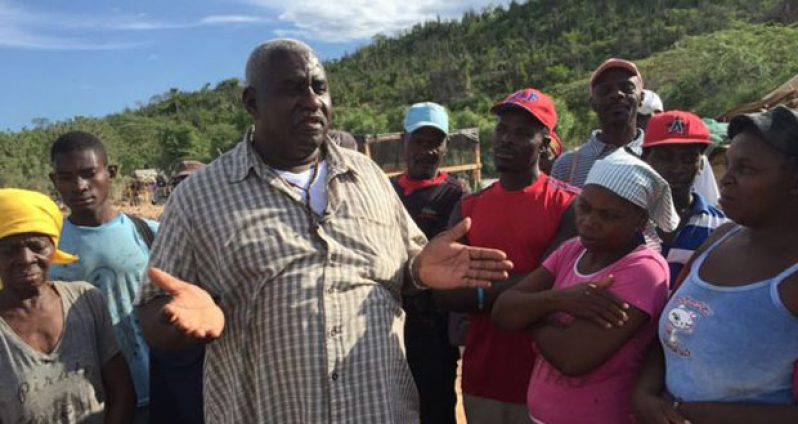By Will Grant
IMMIGRATION has long been a divisive issue on Hispaniola, the Caribbean island shared by Haiti and the Dominican Republic.For decades, large numbers of Haitians have migrated, many of them without papers, to the Dominican Republic, to escape the poverty and lack of employment in their homeland.

In 2013, the Dominican Republic’s highest court ruled that children born there to undocumented migrants were not automatically eligible for Dominican nationality.
An 18-month period followed, in which undocumented migrants were asked to “regulate their status”.
Thousands who did not meet the deadline left the Dominican Republic, with many saying they were forced out by the authorities.
As the BBC’s Will Grant found out, the Catholic Church has played a key role in the migration crisis, with some priests defending the rights of the returnees while others have been criticised for promoting what activists describe as a policy of division.
‘TRAPPED’
Weekly Mass at Parc Cadeau is a simple affair.
The church is a small hut made of wicker and palm, the congregation spread out over a few wooden benches.
Looking around the camp, one of several along Haiti’s border with the Dominican Republic, you might think that the parishioners have little to be thankful for.
It is surely one of the poorest places in Latin America.
A year ago, thousands of returning Haitians arrived at Parc Cadeau.
Some had been forcibly deported from the Dominican Republic; others left voluntarily to avoid confrontation with the authorities.
Today, hundreds of families remain on the dusty ranch, living in hastily erected shacks of plastic sheeting, cardboard and rope, trapped in near stateless limbo.
‘SLEEPING ON THE FLOOR’
Soinicier Giles is typical of many in the camp.
He spent 22 years living as a farmer in the Dominican Republic, before being deported last year.
He takes me to a ramshackle hut to meet his wife, Eleny, and six of their eight children. The other two were left behind when he was deported.
The conditions are extremely harsh, especially for the youngest. “We sleep directly on the floor, and it gets wet inside when it rains,” Eleny explains.
The children were all born in the Dominican Republic itself.
They are showing signs of malnutrition, and have developed a skin condition since arriving at the camp.
“They’re very hungry; we all are, because we can only afford one meal a day,” she says in Creole-accented Spanish.
‘GRAVE CRISIS’
One of the few local figures helping the returnees is the parish priest, Father Luc Leandre.
With funds from the International Organisation for Migration, he has helped relocate some of the most desperate families to nearby communities in Haiti.
“It’s a grave crisis, very, very bad,” Father Leandre tells me.
“The Church is like a mother for everyone, and I have a duty to help. Not only that, the Pope told everyone they have to help the refugees wherever they are.”
But Father Leandre says the attitude of some conservative priests on the other side of the border, particularly in the Dominican capital, Santo Domingo, has complicated his work.
“The cardinal in Santo Domingo is personally very vocal in his support for the deportations. He supported sending all the Haitians back to their country.”
“It’s racism,” he laments, saying the law specifically targeted black Haitians, a charge denied by lawmakers in the Dominican Republic.
‘SHAMELESS’
The priest Father Leandre was referring to has been the most influential voice in the Catholic Church in the Dominican Republic for almost 40 years: The controversial and outspoken Cardinal Nicolas de Jesus Lopez.
Earlier this month, Pope Francis accepted the cardinal’s resignation, which all archbishops are obliged to offer, once they reach the age of 75.
But he will remain an important figure in the Church, and in Dominican public life.
The BBC repeatedly requested an interview with Cardinal Nicolas de Jesus so he could respond to the criticisms against him, but both he and his press secretary declined.
In many ways, the Haitian migrant crisis has exposed greater divisions within the Catholic Church in Hispaniola, over where it should position itself in the 21st Century.
Pope Francis — both the first Jesuit pope and the first from Latin America — designated 2016 as the “Year of Mercy”; and certainly Jesuits have been instrumental in supporting the Haitian returnees.
In a video that went viral, the cardinal was filmed in a furious diatribe about a Jesuit priest called Mario Serrano calling him “shameless” and a “leftist”.
“He’s not very accustomed to being publically confronted,” Mario Serrano tells me from the northern border region of Dajabon, where he works with undocumented Haitians.
“I just said that his kind of speech was not according to the Catholic teaching, and was not for a priest or a Christian.
“I think that really made him mad.”
‘ONLY WAY TO SURVIVE’
Supporters of the new regularisation law, such as the former Dominican ambassador to the US, Flavio Espinal, deny that the legislation was either cruel or motivated by racism.
“Nothing’s perfect; and the process here has not been perfect. Yet, this has been an extraordinary step forward in the direction of regularising close to 300,000 people who were undocumented in this country.
“That’s not an easy decision to make nowadays.”
At night, to avoid detection, the farmer, Soinicier Giles leaves Parc Cadeau and slips back into the Dominican Republic, the border marked by the Pedernales River.
There, he strips the trees for firewood to make charcoal to sell to Dominican traders for a few dollars.
He knows the practice damages the fertility of the soil, but it’s the only available source of income.
“This is the only way we can survive,” he says, motioning at his family, stuck inside the world’s forgotten migrant crisis. (BBC)




.png)









